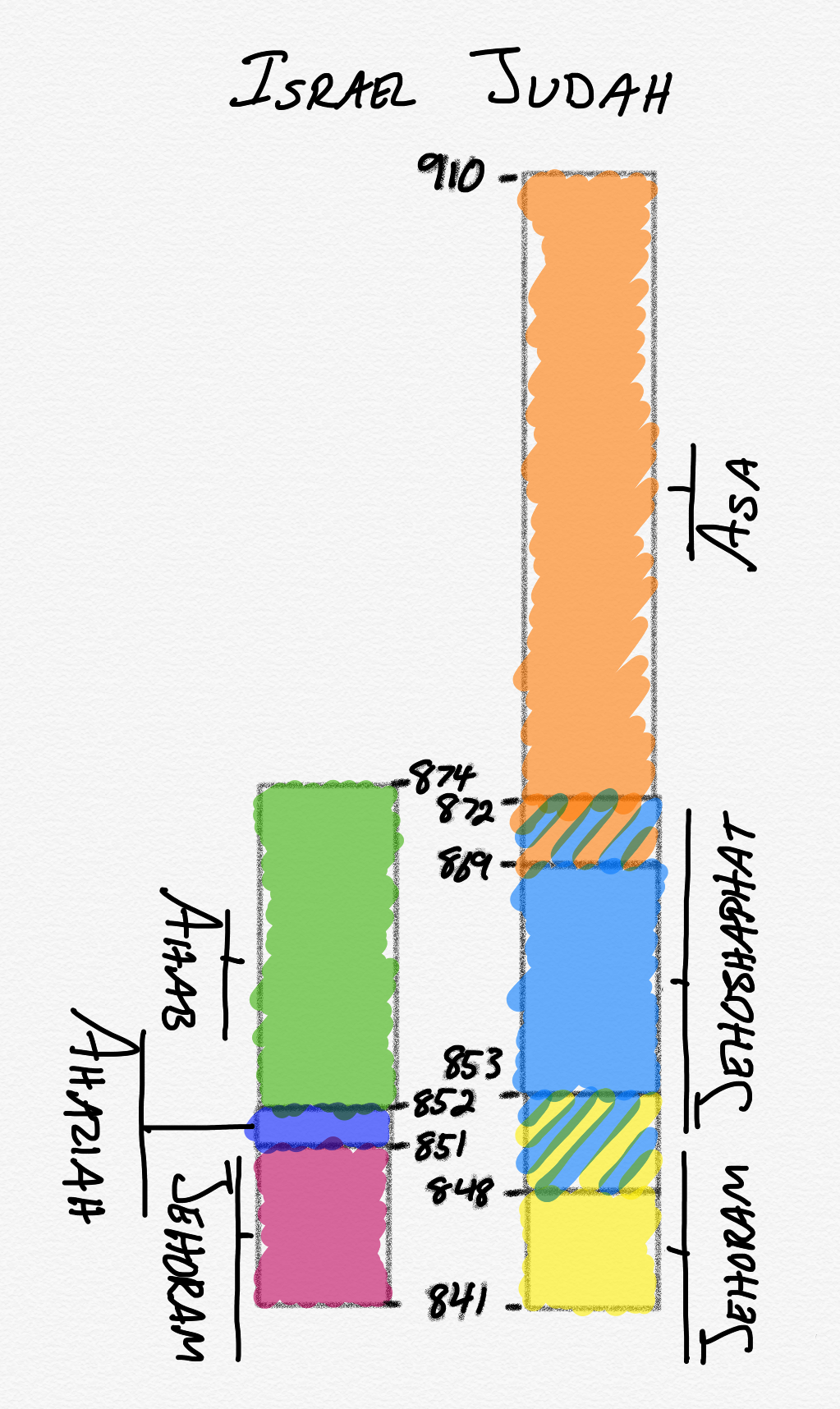This post is part of the series “King Jehoshaphat's Prayer”
We spent a long time talking about one specific prayer of his, so let’s zoom out and look at him in context.
Jehoshaphat was the fourth king of Judah, the southern kingdom of Israel after it split. He was the son of Asa, son of Abijah, son of Rehoboam, son of Solomon, son of David. That makes him Solomon’s great-great-grandson, and David’s great-great-great-grandson. His story is told in 1 Kings 22:41–50 and 2 Chronicles 17:1–21:1.
He reigned for twenty-five years, from the time he was thirty-five until he died (1 Kings 22:42, 2 Chronicles 20:31). That’s about 872–848 BC1, depending on how you count time2. He likely spent the first few years ruling alongside his father Asa after Asa contracted a severe foot disease as a punishment from God (2 Chronicles 16:12), and he apparently served alongside his son Jehoram for the last few years of his life3.

While Jehoshaphat was on the throne in the south, three successive kings ruled in the north: Ahab (the evil husband of the famously evil Jezebel), Ahaziah, and Joram4. Southern kings tended to rule a lot longer than northern kings, because northern kings so often offended God and were punished for it. Jehoshaphat’s father Asa outlasted seven northern kings.
This period was also the period of Elijah and Elisha. They were both prophets to the northern kingdom, but Jehoshaphat had the opportunity to hear from Elisha once before a war against the Moabites (2 Kings 3:14–19). He never met Elijah, but Elijah did send his son Jehoram a letter (2 Chronicles 21:12–15)—a terrifying letter. More on that later.
Was Jehoshaphat A Good King?Permalink
Yes. Mostly.
The authors of Kings and Chronicles definitely thought so, and said so repeatedly:
“He walked in all the ways of Asa his father…doing that which was right in the eyes of the Lord” (1 Kings 22:43)
“The LORD was with Jehoshaphat because he followed in his ancestor David’s footsteps at the beginning of his reign. He did not seek the Baals, but instead sought the God of his ancestors and obeyed his commands, unlike the Israelites. The LORD made his kingdom secure; all Judah brought tribute to Jehoshaphat, and he became very wealthy and greatly respected. He was committed to following the LORD; he even removed the high places and Asherah poles from Judah.” (2 Chronicles 17:3–6)
He revived a practice in Judah that had been commanded by Moses in Deuteronomy 31:10–13, but had been lost. Moses had required that the law be read to the people gathered together every seventh year, but by Jehoshaphat’s time, there were a lot of people who were very spread out, and that was logistically challenging at best. Instead, Jehoshaphat sent officials throughout the country to teach the law (2 Chronicles 17:7–9).
Jehoshaphat apparently really liked this idea of distributing work around the country instead of centralizing it in Jerusalem. He established a complex judicial system in Judah, with local judges around the country (2 Chronicles 19:5–7) and a court of appeals in Jerusalem (2 Chronicles 19:8–10). He even had separate courts for affairs of church and affairs of state (2 Chronicles 19:11).
He finished driving a particular brand of paganism out of Israel (1 Kings 22:46) that had plagued them since the time of Rehoboam three generations earlier (1 Kings 14:24), something his father had almost, but not quite, succeeded in (1 Kings 15:12).
He made peace with the northern kingdom of Israel (1 Kings 22:44), the Edomites that David had conquered (1 Kings 22:47), and other neighboring peoples (2 Chronicles 17:11).
On the other hand, Jehoshaphat had a mixed relationship with places of worship. He removed the sites of pagan worship (2 Chronicles 17:6), but he left the unauthorized places of Yahweh worship (1 Kings 22:43).
Finally, Jehoshaphat allied himself with some wicked people, King Ahab of Israel chief among them. In fact, he joined wars with King Ahab, King Ahaziah, and King Joram—all the kings of Israel while he was alive. You’d think respecting these alliances would be a good thing, but when your allies are evil people… are you really good?
Jehoshaphat’s AlliancesPermalink
Let’s talk about some of those alliances, because they highlight Jehoshaphat’s complexity.
Alliance with AhabPermalink
His first alliance was with King Ahab of Israel (1 Kings 22:2–40, 2 Chronicles 18:3–34).
Ahab had been wanting to go to war against Syria—well, actually, he had been allied with Syria against the Assyrians, but after Assyria was temporarily defeated, he decided to betray his ally. So he calls up Jehoshaphat to go to war alongside him. Now Jehoshaphat’s father Asa had in fact allied with the Syrians against Israel under King Baasha years earlier (1 Kings 15:18–20), but Jehoshaphat answers the call anyway.
Jehoshaphat is a little less rash than Ahab, and insists on asking the prophets whether this war was really a good idea—they would both be breaking alliances with Syria. Ahab’s wife Jezebel was a supporter of the prophets of Baal, so Ahab trots out four hundred prophets who all agree with Ahab that war is a great idea, and victory is sure.
Jehoshaphat notices that not one of them is a prophet of Yahweh, so after some prompting, Ahab calls for Micaiah, but says Micaiah only ever has bad things to say about Ahab. Sure enough, Micaiah starts out sarcastically: “Oh, yeah, totally, Ahab, you go up and fight those Syrians. It’s gonna go great” (2 Kings 22:15, my very loose translation).
Again, Jehoshaphat is wary, so he presses Micaiah, who admits that God does in fact want Ahab to go to war, but only because he’s going to die in battle, so actually the prophets of Baal who thought they had been supporting the king had been doing God’s work and sending Ahab to his death.
Ahab is not a smart man, and he really wants this war, so he ignores the prophecy of Micaiah and goes to war. Jehoshaphat, who is unfortunately more loyal to Ahab than to Yahweh, goes with him. In battle, Ahab disguises himself, but a stray arrow hits him and kills him, fulfilling Micaiah’s prophecy of his death.
When Jehoshaphat returns to Judah, the prophet Jehu reprimands Jehoshaphat for his alliance with the wicked Ahab, but God relents because Jehoshaphat continued to seek Him (2 Chronicles 19:2–3).
Alliance with AhaziahPermalink
Jehoshaphat’s second alliance was with King Ahaziah of Israel (2 Chronicles 20:35–37). This was not a military alliance but a trading one: they built a bunch of ships to go trade for gold, just as Solomon had done so successfully generations earlier (2 Chronicles 8:17–18). However, Ahaziah wasn’t any more upright than Ahab, and the prophet Eliezer tells Jehoshaphat that the ships would wreck because of his alliance with another evil king. Sure enough, they do.
Alliance with JehoramPermalink
There’s only one king of Israel left that Jehoshaphat hasn’t allied himself with: Joram. So of course the third alliance is with him (2 Kings 3:5–27). The story is actually very similar to the previous alliance with Israel.
Under King Ahab, Moab had been subject to Israel, but Joram is a weaker king, so he has to go to war to defend his kingdom. He invites Jehoshaphat, who remembers his alliance with Ahab and how well that went, and… honors it, despite Jehu’s warning. Again, loyalty to his fellow king won out over loyalty to God.
However, he does again insist on asking the prophets, even though he didn’t listen last time. Instead of the mostly unknown Micaiah, this time Elisha—Elisha!—is available. But Elisha refuses to give counsel to Joram—he says he should go ask his father’s prophets, the ones who sent his father Ahab to his death in the war with Syria. Elisha is willing to talk to Jehoshaphat, however, because Jehoshaphat is a godly king.
Not only does Elisha prophesy that they will win, he tells them how. They dig a bunch of pits in the land and fill them with water. The next morning, the Moabites see the pits in the morning sun and think they’re pools of blood and that the armies of Israel and Judah must have destroyed each other. So they attack, and they’re soundly defeated.
Jehoshaphat’s PrayerPermalink
There’s one more war we haven’t discussed, and it’s the one where Jehoshaphat prayed that beautiful prayer. You can get the whole story by just entering your e-mail below:
Jehoshaphat had apparently learned from his alliances with the evil kings of Israel, or maybe from his repeated warnings from the prophets, and during his war against the Moabites and Ammonites, he looks to God instead of to human alliances, and God destroys his enemies before him.
Listening to God is good.
Jehoshaphat’s LegacyPermalink
King Jehoshaphat’s son Jehoram reigned after him. Unfortunately, part of Jehoshaphat’s alliance with Ahab of Israel was that Jehoram had married Ahab’s daughter Athaliah, and Athaliah was a terrible influence.
As king, Jehoram killed his brothers, Jehoshaphat’s sons. He supported and spread Baal worship in Judah. He was so bad that Elijah sent him a letter announcing that God would punish him by defeat in war and by a fatal (and gross) personal disease.
But God loved David and made him a promise, so despite Jehoram’s wickedness, the royal line was not broken, and Jehoshaphat is mentioned one more time in Scripture: Matthew 1:8, in the lineage of Jesus of Nazareth.
-
Edwin R. Thiele, A Chronology of the Hebrew Kings ↩
-
Israel counted their years from one month, and Judah counted their years from a different month, so when you compare the timelines of each kingdom, they’re always about six months off. ↩
-
We can figure out the overlapping reigns by comparing the timelines of kings of each kingdom. By comparing 2 Kings 1:17, 3:1, and 8:16, we see that Jehoram must have ruled alongside his father for the first four or five years (about 853–848 BC). ↩
-
Joram’s name is sometimes spelled Jehoram, which is very confusing because Jehoshaphat’s son was also named Jehoram, and in fact Joram and Jehoram ruled at the same time after Jehoshaphat’s death. ↩



